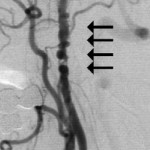 Stroke is common during the first few weeks after a transient ischemic attack (TIA) or minor ischemic stroke. Combination therapy with clopidogrel and aspirin may provide greater protection against subsequent stroke than aspirin alone.
Stroke is common during the first few weeks after a transient ischemic attack (TIA) or minor ischemic stroke. Combination therapy with clopidogrel and aspirin may provide greater protection against subsequent stroke than aspirin alone.
In a randomized, double-blind, placebo-controlled trial conducted at 114 centers in China, we randomly assigned 5170 patients within 24 hours after the onset of minor ischemic stroke or high-risk TIA to combination therapy with clopidogrel and aspirin (clopidogrel at an initial dose of 300 mg, followed by 75 mg per day for 90 days, plus aspirin at a dose of 75 mg per day for the first 21 days) or to placebo plus aspirin (75 mg per day for 90 days). All participants received open-label aspirin at a clinician-determined dose of 75 to 300 mg on day 1. The primary outcome was stroke (ischemic or hemorrhagic) during 90 days of follow-up in an intention-totreat analysis. Treatment differences were assessed with the use of a Cox proportional- hazards model, with study center as a random effect.
Stroke occurred in 8.2% of patients in the clopidogrel–aspirin group, as compared with 11.7% of those in the aspirin group (hazard ratio, 0.68; 95% confidence interval, 0.57 to 0.81; P<0.001). Moderate or severe hemorrhage occurred in seven patients (0.3%) in the clopidogrel–aspirin group and in eight (0.3%) in the aspirin group (P = 0.73); the rate of hemorrhagic stroke was 0.3% in each group.
Among patients with TIA or minor stroke who can be treated within 24 hours after the onset of symptoms, the combination of clopidogrel and aspirin is superior to aspirin alone for reducing the risk of stroke in the first 90 days and does not increase the risk of hemorrhage.